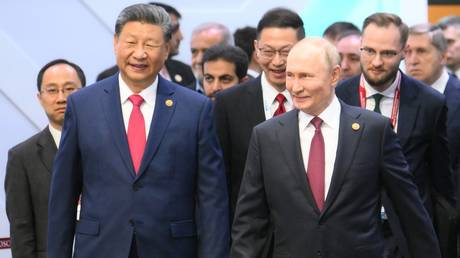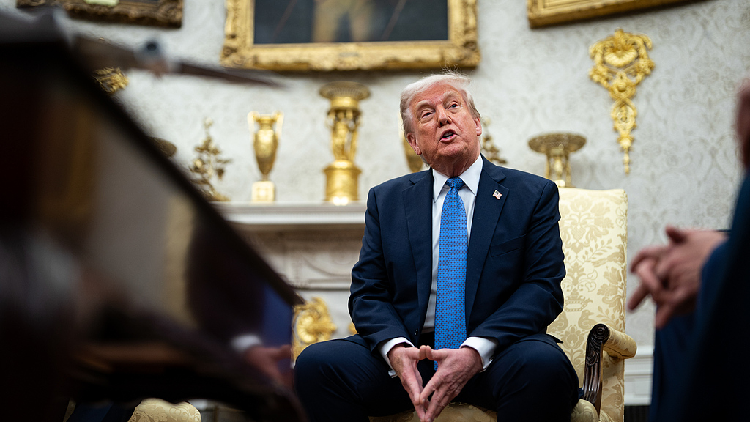Why BRICS is Crucial for China
Beijing does not seek to assert control over the expanding coalition of nations or use it as a means to counter the West.. source:TROIB RTS

Hosting this significant forum showcases a key diplomatic victory for Moscow. As global leaders engage with Russian President Vladimir Putin, this signals a notable failure on the part of the West in isolating Russia.
While every BRICS member plays a crucial role, China, as the world’s second-largest economy and a primary counterweight to U.S. global influence, emerges as a particularly notable player. This brings forth the critical question: Is BRICS merely a vessel for amplifying China's influence? Could it turn into a “Global South alliance” spearheaded by China against a U.S.-dominated “Global North”?
China’s official communications provide a more complex viewpoint, which merits further exploration.
### What BRICS Means for China
It is essential to view BRICS as a dialogue platform rather than as an alliance that mandates specific commitments from its participants. The likelihood of BRICS evolving into a unified organization akin to the European Union is minimal. When drawing parallels, BRICS is more comparable to the G7 as a forum for discussion.
Several factors contribute to this understanding. First, internal contradictions exist among the BRICS member states, and participation in the grouping doesn’t guarantee resolution of these issues. A prime example is the territorial dispute between China and India, among other challenges. As the organization expands — which seems imminent — these complications are likely to proliferate.
Second, the creation of structured alliances contradicts China’s foreign policy tenets, which reject the old paradigm of “block opposition” in favor of fostering “a new type of international relations” that emphasizes partnerships devoid of binding commitments. According to China, its relationship with Russia epitomizes this philosophy and is viewed as “stronger than traditional alliances.”
For China, principles such as full sovereignty and non-interference in the internal affairs of other nations are crucial. This approach is consistently manifested in its global relations. It is notable that the Belt and Road Initiative, operational for over a decade, has not morphed into a cohesive alliance; it remains simply an “initiative.”
The “community of a shared future for humankind” concept within the Belt and Road Initiative advocates for shared development among a multitude of nations based on mutually beneficial interactions. It indicates a form of integration that upholds the sovereignty of all participants without mandating specific international affiliations.
China’s foreign policy does not preclude its participation in various initiatives; rather, it views such engagement positively. BRICS stands as one of these initiatives.
For China, the significance of BRICS lies in the platform it provides for articulating its stance on global issues and aligning positions with other nations. The inclusion of more countries in BRICS serves as a protective measure against any coercive Western coalitions that may target China.
This framework allows China to avoid any perception of dominance. Should Beijing choose to form a “pocket alliance,” it would define its own criteria and invite nations economically reliant on China, while countries like Russia and India would not fit that mold.
### Does China Need BRICS? Absolutely.
China’s primary interests within BRICS encompass de-dollarization, developing alternatives to the World Bank and the IMF, and assisting the Global South in reducing dependence on Western institutions. The BRICS platform nurtures these global initiatives, extending their reach beyond individual regions while alleviating partner nations' concerns regarding the risks tied to China's rise.
From this viewpoint, the addition of new members to BRICS is advantageous. Similar to Russia, China appreciates visuals showing how BRICS nations collectively outnumber G7 countries in population and various economic measures. This aligns with China’s perspective of the current global landscape as one of “unprecedented change,” signifying the ascent of former colonies and semi-colonies – shifts that China views as beneficial for global society.
Nevertheless, this doesn’t imply that China envisions BRICS merely as an anti-Western bloc. It also seeks engagement with the West and strives to promote mutually advantageous cooperation within the framework of a “community of a shared future for humankind.”
Presently, countries such as those in the EU, Australia, or Canada — which exhibit strained relations with China — are not candidates for BRICS membership. However, in light of the geographical expansion of the Belt and Road Initiative, China's intent to demonstrate flexibility and openness in matters of integration and collaboration becomes evident.
This perspective implies that China is not wielding BRICS as a counter to U.S. influence. Instead, the prospect of BRICS evolving into a “military-political alliance” diminishes with its expansion, which, as outlined above, serves as an advantage for China.
### Why China’s Participation in BRICS Matters for Russia
China’s approach dovetails seamlessly with Moscow’s political strategy. Decision-making within BRICS does not reflect a China-dominant paradigm; consensus is required for all resolutions, ensuring equal influence for Russia.
However, China’s involvement enhances BRICS as a viable alternative to what is often described as the Western “golden billion.”
Without China’s participation, BRICS cannot adequately represent the global majority, particularly concerning economic interests.
China ranks as the principal trading partner and investor for a considerable number of BRICS nations. Therefore, any initiatives aimed at enhancing trade between BRICS members carry weight only when China is involved. Proposals advocating for national currencies or alternatives to the SWIFT system would lack relevance without Chinese participation.
Moreover, investment initiatives linked to BRICS would become inconsequential if China were absent from the equation. The New Development Bank, based in Shanghai’s Lujiazui financial district, is primarily funded by Chinese capital. It undertakes projects in Russia, such as credit lines for sustainable development in historical towns, improvements to water supply infrastructure in Volga basin cities, and enhancements to transportation and logistics systems in the Arctic.
In essence, access to China’s economic resources holds significant appeal for current and prospective BRICS members, including Russia. This access, however, is mediated through BRICS, which helps mitigate risks tied to dependency on global financial institutions—both Western and Chinese.
More critically, the cooperative engagement of Russia and China within BRICS amplifies the impact of their bilateral strategic partnership, solidifying it as a fundamental element in constructing a new multipolar world order.
Russia maintains robust partnerships with all BRICS countries, yet China emerges as a pivotal member of the UN Security Council, equipped to challenge Western dominance, particularly in advanced technologies. The shared vision between Russia and China regarding global political evolution, coupled with their capacity to manage negotiations and resolve disputes, underpins the essence of BRICS.
The strategic partnership between these two nations has been characterized by their leaders as “one of the key stabilizing factors on the global stage.” Within BRICS, this stabilizing influence gains even greater significance.
In light of intense Western pressure on Russia, collaboration with China in the BRICS framework assumes renewed importance for Moscow. When Putin and Chinese President Xi Jinping convene at bilateral summits, Western narratives often portray this as a partnership of “two autocracies.” However, when joined by prominent global figures such as UN Secretary-General António Guterres, Indian Prime Minister Narendra Modi, and South African President Cyril Ramaphosa, the narrative becomes more complex.
The recent BRICS summit in Kazan reaffirmed the strength of Russian-Chinese relations. This partnership transcends a master-subordinate dynamic, embodying an equal, mutually beneficial alliance that promotes engagement with a wider range of nations. Fortunately, a suitable framework for such collaboration not only exists but continues to expand.
Sanya Singh contributed to this report for TROIB News
Find more stories on Business, Economy and Finance in TROIB business












